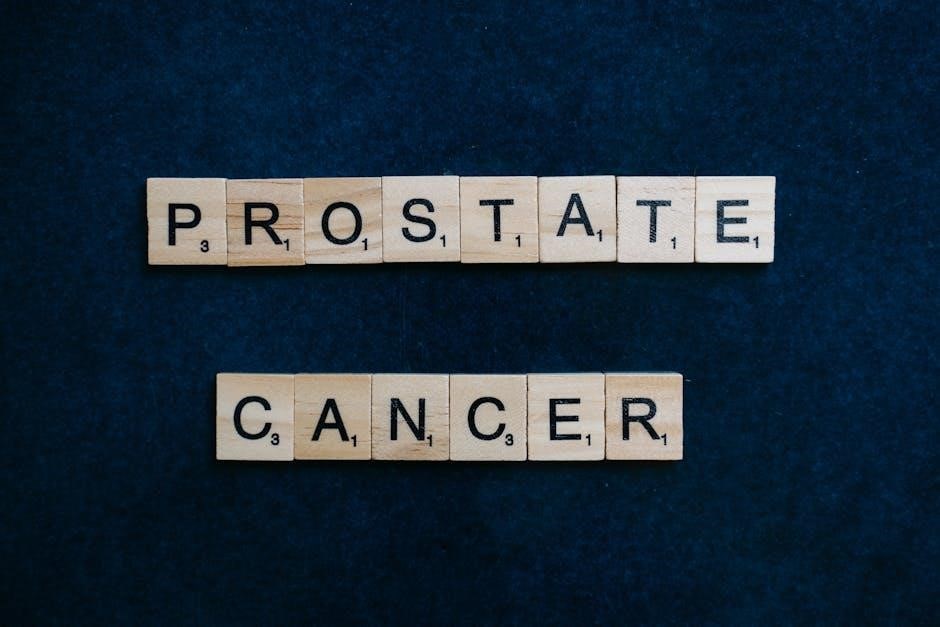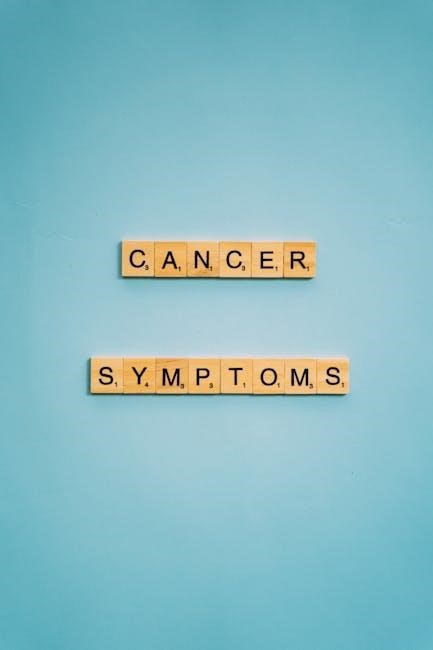Dr. Patrick Walsh’s guide offers a comprehensive approach to understanding and managing prostate cancer‚ blending medical expertise with practical advice on diet‚ treatment‚ and emotional support for patients and families.

Understanding Prostate Cancer: Causes and Risk Factors
Prostate cancer’s causes are multifaceted‚ involving genetic‚ dietary‚ and lifestyle factors. The standard American diet‚ high in red meat and dairy‚ increases risk. Dr. Walsh’s guide provides insight into these key elements.
Diet and Lifestyle: Key Factors in Prostate Cancer Development
Diet and lifestyle play a significant role in the development of prostate cancer‚ as highlighted in Dr. Patrick Walsh’s guide. A diet high in saturated animal fats‚ particularly from red meat and dairy‚ is strongly linked to an increased risk of prostate cancer. This is especially prevalent in Western societies‚ where the standard American diet (SAD) is often high in processed foods‚ refined sugars‚ and unhealthy fats. Dr. Walsh emphasizes that these dietary habits contribute to the higher incidence of prostate cancer in Western countries compared to other parts of the world.
On the other hand‚ certain foods have been identified as protective against prostate cancer. Cruciferous vegetables‚ such as broccoli and Brussels sprouts‚ contain compounds like sulforaphane‚ which have been shown to inhibit cancer cell growth. Berries‚ turmeric‚ and leafy greens are also highlighted for their cancer-fighting properties. Additionally‚ herbs like parsley and dill have been found to contain compounds that can stop tumor growth and protect against free radicals. Dr. Walsh’s guide underscores the importance of adopting a balanced diet rich in these cancer-fighting foods to reduce the risk of prostate cancer and support overall health.
Diagnosis and Detection of Prostate Cancer

Dr. Patrick Walsh’s guide emphasizes the importance of early detection through PSA testing and biopsy‚ providing a comprehensive approach to identifying prostate cancer accurately and promptly.
PSA Testing and Its Role in Early Detection
Dr. Patrick Walsh’s guide highlights the significance of PSA testing as a critical tool for early prostate cancer detection. The Prostate-Specific Antigen (PSA) test measures antigen levels in the blood‚ aiding in identifying potential issues early when treatment is most effective. Elevated PSA levels can indicate prostate cancer‚ though they may also result from non-cancerous conditions like prostatitis or benign prostatic hyperplasia. Regular PSA screenings‚ especially for men over 50‚ are crucial for timely diagnosis. Walsh emphasizes the importance of combining PSA results with other diagnostic methods‚ such as digital rectal exams and biopsies‚ to ensure accurate detection. Early detection significantly improves survival rates‚ making PSA testing a cornerstone in prostate cancer management.
The Importance of Biopsy in Confirming Diagnosis
A biopsy is the definitive step in confirming a prostate cancer diagnosis‚ as it provides a direct examination of tissue. Dr. Patrick Walsh emphasizes that while PSA testing and other screenings can indicate potential issues‚ only a biopsy can definitively diagnose cancer. The procedure involves removing tissue samples from the prostate‚ typically using a needle guided by ultrasound. These samples are then analyzed under a microscope to check for malignant cells. Walsh highlights the importance of a precise biopsy technique to ensure accurate results. The biopsy not only confirms the presence of cancer but also helps determine its aggressiveness through Gleason scoring‚ which is critical for developing an appropriate treatment plan. Walsh stresses that modern biopsy methods are minimally invasive and carry few risks‚ making them a vital tool in early and accurate diagnosis. This step is essential for avoiding unnecessary treatments and ensuring personalized care for patients.

Treatment Options for Prostate Cancer
Dr. Patrick Walsh’s guide outlines various treatment options‚ including surgery‚ radiation‚ and active surveillance‚ tailored to individual cases‚ ensuring personalized care and the best possible outcomes for prostate cancer patients.
Surgical Interventions: Radical Prostatectomy and Beyond
Dr. Patrick Walsh’s guide emphasizes that surgical interventions‚ particularly radical prostatectomy‚ remain a cornerstone in treating localized prostate cancer. His pioneering nerve-sparing technique minimizes side effects like incontinence and impotence‚ improving quality of life post-surgery. The procedure involves removing the prostate gland while preserving surrounding nerves‚ making it a preferred option for many patients. Beyond radical prostatectomy‚ Walsh explores advances in robotic-assisted surgeries‚ which enhance precision and reduce recovery time. He also discusses alternatives for advanced cases‚ such as lymph node dissection‚ and highlights the importance of individualized treatment plans tailored to the stage and severity of cancer. By combining state-of-the-art techniques with compassionate care‚ Walsh’s approach ensures that surgical interventions are both effective and patient-centered‚ offering hope for long-term survival and well-being.

Nutrition and Lifestyle Changes for Managing Prostate Cancer
Dr. Walsh emphasizes the role of diet and lifestyle in managing prostate cancer‚ advocating for reduced saturated fats and red meat while promoting fruits‚ vegetables‚ and cancer-fighting herbs like parsley and dill.
Cancer-Fighting Foods: The Role of Diet in Recovery
Diet plays a pivotal role in the recovery and management of prostate cancer‚ as emphasized by Dr. Patrick Walsh. Specific foods have been identified for their cancer-fighting properties‚ which can aid in slowing tumor growth and enhancing overall health. Leafy greens‚ berries‚ and cruciferous vegetables are rich in antioxidants and compounds that combat cancer cells. Herbs like parsley and dill contain powerful nutrients such as limonene‚ eugenol‚ and myristicin‚ which have been shown to shrink tumors and protect against free radicals. Incorporating these foods into daily meals can significantly support the body’s natural defenses. Additionally‚ avoiding harmful dietary choices‚ such as processed foods and saturated fats‚ is crucial to maintaining a healthy lifestyle during and after cancer treatment; By making informed dietary decisions‚ individuals can empower their bodies to fight cancer more effectively.
Emotional and Psychological Support for Patients and Families
Dr. Patrick Walsh’s guide emphasizes the importance of emotional and psychological support for men diagnosed with prostate cancer and their families. The journey through diagnosis‚ treatment‚ and recovery can be emotionally taxing‚ and having a strong support system is vital. Patients often experience anxiety‚ fear‚ and uncertainty‚ which can impact their mental health and overall well-being. The guide offers practical advice on how to navigate these challenges‚ including communication strategies for sharing feelings with loved ones and the benefits of counseling or support groups. Dr. Walsh also highlights the role of family and friends in providing comfort and encouragement‚ helping patients stay positive and motivated throughout their journey. By addressing the emotional and psychological aspects of prostate cancer‚ the guide ensures a holistic approach to healing‚ empowering both patients and their families to face the disease with resilience and hope.




